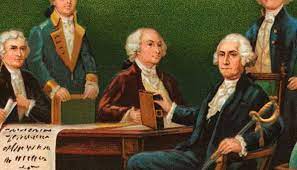Table of Contents
Introduction
George Washington’s presidency was marked by numerous challenges, both domestic and international. Among these challenges was the issue of inflation, which posed a significant threat to the young nation’s economic stability. In this article, we delve into the economic landscape of the early Republic, exploring the causes and consequences of inflation during Washington’s tenure, as well as the strategies employed to address this pressing issue.
Understanding the Economic Context

To comprehend the economic challenges faced by George Washington, it is crucial to contextualize the period in which he assumed office. Following the Revolutionary War, the United States was burdened with war debt, disrupted trade routes, and a fragile financial system. Moreover, the absence of a central banking system and a uniform currency further complicated matters, leading to rampant inflation in the aftermath of the war.
Causes of Inflation
Several factors contributed to the inflationary pressures experienced during Washington’s presidency. Firstly, the war debt incurred during the Revolutionary War exerted immense strain on the nation’s finances. The federal government, lacking the authority to levy taxes effectively, resorted to issuing paper money known as “continentals” to finance the war effort. However, excessive printing of these continentals led to hyperinflation, rendering them virtually worthless.
Furthermore, the disruption of trade routes during the war exacerbated inflationary pressures. With limited access to imported goods, domestic prices soared, further fueling inflation. Additionally, the absence of a stable banking system meant that state-chartered banks could issue their own currencies, leading to a proliferation of banknotes with varying values, exacerbating economic instability.
Consequences of Inflation

The consequences of inflation were profound and far-reaching, impacting various sectors of society. Firstly, inflation eroded the purchasing power of ordinary citizens, particularly farmers and laborers, whose wages failed to keep pace with rising prices. This led to widespread discontent and economic hardship, exacerbating social tensions within the young nation.
Moreover, inflation undermined investor confidence and hindered economic growth. With uncertain price levels and volatile currency values, entrepreneurs were reluctant to invest in productive ventures, hampering the development of industries essential for the nation’s prosperity.
Strategies to Combat Inflation
George Washington and his administration implemented several strategies to address the issue of inflation and restore economic stability. Firstly, recognizing the need for fiscal responsibility, Washington prioritized the repayment of the war debt, seeking to regain the trust of creditors and stabilize the nation’s finances. Through the enactment of measures such as the Funding Act of 1790 and the establishment of the Bank of the United States in 1791, Washington aimed to centralize fiscal authority and instill confidence in the government’s ability to manage its finances effectively.
Furthermore, Washington advocated for the promotion of domestic industries and the diversification of the economy to reduce reliance on imported goods. The imposition of tariffs on foreign imports aimed to protect domestic producers and stimulate economic growth, thereby mitigating the adverse effects of inflation.
Conclusion
In conclusion, inflation posed a formidable challenge to George Washington and the fledgling Republic during its formative years. However, through prudent fiscal management and strategic interventions, Washington succeeded in stabilizing the nation’s economy and laying the foundation for future prosperity. The lessons learned from Washington’s approach to combating inflation continue to resonate today, underscoring the importance of fiscal discipline, sound monetary policy, and economic diversification in safeguarding against inflationary pressures. As the United States grapples with contemporary economic challenges, the legacy of George Washington serves as a reminder of the resilience and ingenuity required to overcome adversity and forge a path towards sustainable economic growth.
For More Information Please Visit These Websites Mindmeister